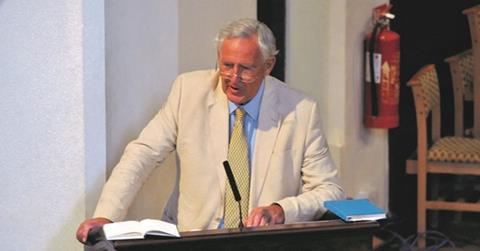Jonathan Fletcher was vicar of Emmanual Church Wimbledon and highly regarded in the conservative evangelical community for three decades. But according to a new report from Christian safeguarding charity Thirtyone:eight, he engaged in sexually abusive behaviour and church leaders failed to handle allegations properly. Andrew Hawkins says it is time for Christians to learn important lessons

After almost 30 years attending conservative evangelical Anglican (CE) churches, including 14 years at Emmanuel Church Wimbledon (ECW) from the mid-1990s, revelations about Jonathan Fletcher’s abuse felt like a kick in the guts.
The review’s revelation of (doubtless only some of) the abuse that took place behind closed doors helped bridge the disconnect between memories of Fletcher as the erudite preacher and Bible teacher, and Fletcher the predatory abuser. When the abuse was first reported it was difficult to work out whether he was being singled out unfairly, or whether he really was a wolf. Well, if anyone had any doubts, we now know.
It is extremely disturbing to reflect that so many brothers and sisters, perhaps sometimes sitting next to me in the pew or at a Bible study, were wrestling with the anguish, shame, guilt and fear of Fletcher’s abuse. That it could have happened right under our noses is awful.
I cannot imagine the pain being suffered by Fletcher’s victims, or the sense of being let down by a culture that failed them so badly. My anger at what happened is trivial in comparison, but I still feel plenty, having enthusiastically invited friends and colleagues to evangelistic events where Fletcher spoke, and holding the three of our children’s baptisms at ECW with non-Christian friends and family present. Let’s be under no illusion: by bringing the gospel into disrepute, Fletcher’s behaviour will almost certainly lead some to reject Jesus. That is very serious indeed.
My aim is not to contribute more bullets to the post-Review Mexican shoot-out, but to offer hope that some good may yet come from these terrible revelations. In fact, we owe it to all the victims of Fletcher, and others who have misused their power – and may still be doing so, to make this the beginning of a transformation in culture across the whole CE constituency.
The Thirtyone:eight review accurately describes aspects of the culture at ECW back in the 80s and 90s. There were many occasions when we made excuses, even if only to ourselves, for Fletcher’s rude and dismissive treatment of people in public, but by his hiding in plain sight it was impossible to join the dots. That camouflaging of abuse makes cultural change all the more urgent.
The review rightly therefore concludes that while ”not suggesting all CE organisations are implicated in this report…it is essential that organisations review, and hold themselves to some external account, to ensure that the lessons learned from this Review can be enacted” (my emphasis).
CE churches so often have laudable and godly qualities. They can be places where teaching the Bible is taken seriously and where many people grow in their knowledge and love of Jesus.
But, as the review showed, they can also be places dominated by individuals who use their knowledge of scripture to wield power over others, often without effective governance structures, accountability or transparency. In such conditions, abusers can thrive.
So instead of trying to push our own agenda, or descending into depression about the state of CE churches, let’s bear in mind Genesis 50:20 when Joseph said to his father and brothers, “You intended to harm me, but God intended it for good to accomplish what is now being done, the saving of many lives.” A good outcome starts when we can move on from the opprobrium and start working to ensure that this can never happen again.
Whether you are a church leader or member, here are five questions to help consider how God can work this dreadful situation to his good.
1. If you are a CE church leader, will you commit to having an open review, preferably led by members of your congregation, to consider your church culture, governance, accountability, transparency, leadership style and diversity?
2. Will you commit to making your church a place where the protection of victims is always prioritised over the interests of abusers, however powerful or credible they might be?
3. Will you consider which of these you love more: the reputation of your church, ministry or theological tribe, your most awkward church member, or the homeless person sleeping in your church porch? How much time is spent looking after ‘the least of these’, compared to non-parish matters?
4. Does your church love the Bible and value ‘correct’ theology more than Jesus or your neighbours? Would a visitor to your church see it characterised by love in your dealings with one another? The Thirtyone:eight review brings to life Paul’s stern warning in 1 Corinthians 13, that without love we are nothing. How we treat Christians from different church traditions, or people from different social backgrounds, says so much about the state of our spiritual pride.
5. Finally, will you embrace this imperative to transform your church into a loving, outward-looking community, committed to worship, fellowship, discipleship, ministry and mission together?
There is clearly a huge amount of pain to be worked through. But, whatever else happens as a result of the Thirtyone:eight review, we should not and must not miss this unique moment God has put before us to transform his church to become more like the community he intends us to be.






























